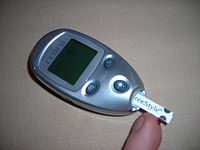
Effectiveness of insulin glargine U-300 versus insulin glargine U-100 on nocturnal hypoglycemia and glycemic control in type 1 and type 2 diabetes: a systematic review and meta-analysis
Sign Up to like & getrecommendations! Published in 2018 at "Acta Diabetologica"
DOI: 10.1007/s00592-018-1258-0
Abstract: AimsTo assess the effectiveness of insulin glargine 300 ui/ml (Gla-300) compared with insulin glargine 100 ui/ml (Gla-100) on reducing nocturnal hypoglycemia and improving glycemic control in type 1 and type 2 diabetes patients.MethodsWe systematically searched… read more here.
Keywords: type; insulin glargine; hypoglycemia; nocturnal hypoglycemia ... See more keywords

Hypoglycemia Communication in Primary Care
Sign Up to like & getrecommendations! Published in 2021 at "Journal of General Internal Medicine"
DOI: 10.1007/s11606-021-06911-5
Abstract: T o Drs. Brož and Brožová: Thank you for the interest in our study, and your suggestion that future studies should examine communication around nocturnal hypoglycemia. We agree and thank you for pointing out this… read more here.
Keywords: hypoglycemia communication; primary care; hypoglycemia; nocturnal hypoglycemia ... See more keywords

Value of Capillary Glucose Profiles in Assessing Risk of Nocturnal Hypoglycemia in Type 1 Diabetes Based on Continuous Glucose Monitoring
Sign Up to like & getrecommendations! Published in 2020 at "Diabetes Therapy"
DOI: 10.1007/s13300-020-00787-0
Abstract: Introduction This study aimed to evaluate the occurrence of nocturnal hypoglycemia in type 1 diabetes (T1D) based on continuous glucose monitoring (CGM), and to explore the value of capillary glucose profiles in assessing the risk of… read more here.
Keywords: capillary glucose; hypoglycemia; risk nocturnal; blood glucose ... See more keywords

"Smart" Composite Microneedle Patch Stabilizes Glucagon and Prevents Nocturnal Hypoglycemia: Experimental Studies and Molecular Dynamics Simulation.
Sign Up to like & getrecommendations! Published in 2022 at "ACS applied materials & interfaces"
DOI: 10.1021/acsami.1c24955
Abstract: Hypoglycemia is a major complication associated with insulin therapy in people with diabetes that could cause life-threatening conditions if untreated. Glucagon, a counter-acting hormone, is thus administered for rescue of severe hypoglycemia. However, due to… read more here.
Keywords: glucagon; hypoglycemia; nocturnal hypoglycemia; smart composite ... See more keywords

Electroencephalogram Spectral Moments for the Detection of Nocturnal Hypoglycemia
Sign Up to like & getrecommendations! Published in 2020 at "IEEE Journal of Biomedical and Health Informatics"
DOI: 10.1109/jbhi.2019.2931782
Abstract: Hypoglycemia or low blood glucose is the most feared complication of insulin treatment of diabetes. For people with diabetes, the mismatch between the insulin therapy and the body's physiology could increase the risk of hypoglycemia.… read more here.
Keywords: hypoglycemia; spectral moments; electroencephalogram spectral; moments detection ... See more keywords

Preventive effect of ipragliflozin on nocturnal hypoglycemia in patients with type 2 diabetes treated with basal‐bolus insulin therapy: An open‐label, single‐center, parallel, randomized control study
Sign Up to like & getrecommendations! Published in 2017 at "Journal of Diabetes Investigation"
DOI: 10.1111/jdi.12588
Abstract: The efficacy of the administration of sodium‐glucose co‐transporter 2 inhibitor or the co‐administration of sodium‐glucose co‐transporter 2 inhibitor and dipeptidyl peptidase‐4 inhibitor to insulin therapy is not well known. A total of 58 patients with… read more here.
Keywords: insulin; inhibitor; insulin therapy; type diabetes ... See more keywords

Nocturnal hypoglycemia is underdiagnosed in older people with insulin-treated type 2 diabetes: The HYPOAGE observational study.
Sign Up to like & getrecommendations! Published in 2023 at "Journal of the American Geriatrics Society"
DOI: 10.1111/jgs.18341
Abstract: BACKGROUND There is a lack of real-life data regarding the frequency and predictive factors of hypoglycemia in older patients with type 2 diabetes (T2D). This study aimed to determine the frequency and predictors of hypoglycemia… read more here.
Keywords: underdiagnosed older; type diabetes; hypoglycemia; nocturnal hypoglycemia ... See more keywords

Confirmation of the Absence of Somogyi Effect in Patients with Type 2 Diabetes by Retrospective Continuous Glucose Monitoring Systems
Sign Up to like & getrecommendations! Published in 2022 at "International Journal of Endocrinology"
DOI: 10.1155/2022/6599379
Abstract: Background The Somogyi effect is defined as fasting hyperglycemia secondary to nocturnal hypoglycemia. In past decades, this effect proved to be rare or absent. However, many endocrinologists still believe in this phenomenon in clinical practice.… read more here.
Keywords: somogyi effect; fasting glucose; hypoglycemia; nocturnal hypoglycemia ... See more keywords

270-OR: Nocturnal Hypoglycemia with Insulin Degludec and Glargine U100 in Patients with Type 1 Diabetes Prone to Severe Nocturnal Hypoglycemia (HypoDeg): A CGM Substudy
Sign Up to like & getrecommendations! Published in 2020 at "Diabetes"
DOI: 10.2337/db20-270-or
Abstract: Background and Aims: Nocturnal hypoglycemia is a major source of concern of people with type 1 diabetes (T1D) and may result in suboptimal glycemic control due to avoidance behavior. Optimal basal insulin therapy may reduce… read more here.
Keywords: self novo; insulin; nocturnal hypoglycemia; hypoglycemia ... See more keywords

340-P: Nocturnal Hypoglycemia Prediction in Hospitalized Patients with Type 1 Diabetes Using Combined Supervised and Unsupervised Ensemble Learning
Sign Up to like & getrecommendations! Published in 2021 at "Diabetes"
DOI: 10.2337/db21-340-p
Abstract: The Aim: To assess the efficacy of combined supervised and unsupervised ensemble machine learning based on continuous glucose monitoring (CGM) data for short-term prediction of nocturnal hypoglycemia (NH) in hospitalized patients with type 1 diabetes… read more here.
Keywords: combined supervised; unsupervised ensemble; nocturnal hypoglycemia; hospitalized patients ... See more keywords

Machine Learning Models for Nocturnal Hypoglycemia Prediction in Hospitalized Patients with Type 1 Diabetes
Sign Up to like & getrecommendations! Published in 2022 at "Journal of Personalized Medicine"
DOI: 10.3390/jpm12081262
Abstract: Nocturnal hypoglycemia (NH) is a dangerous complication of insulin therapy that often goes undetected. In this study, we aimed to generate machine learning (ML)-based models for short-term NH prediction in hospitalized patients with type 1… read more here.
Keywords: patients type; hospitalized patients; machine learning; prediction ... See more keywords